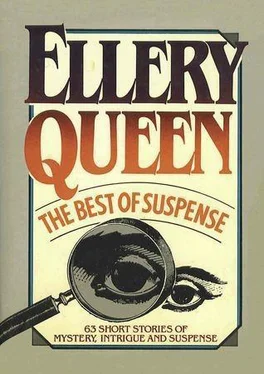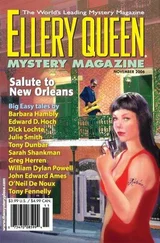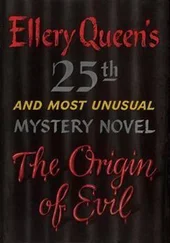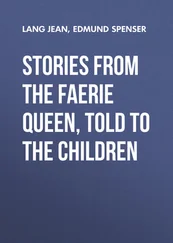Jean Backus - Ellery Queen. The Best of Suspense
Здесь есть возможность читать онлайн «Jean Backus - Ellery Queen. The Best of Suspense» весь текст электронной книги совершенно бесплатно (целиком полную версию без сокращений). В некоторых случаях можно слушать аудио, скачать через торрент в формате fb2 и присутствует краткое содержание. Город: New York, Год выпуска: 1980, ISBN: 1980, Издательство: Galahad, Жанр: Детектив, на английском языке. Описание произведения, (предисловие) а так же отзывы посетителей доступны на портале библиотеки ЛибКат.
- Название:Ellery Queen. The Best of Suspense
- Автор:
- Издательство:Galahad
- Жанр:
- Год:1980
- Город:New York
- ISBN:978-0-88365-642-6
- Рейтинг книги:5 / 5. Голосов: 1
-
Избранное:Добавить в избранное
- Отзывы:
-
Ваша оценка:
- 100
- 1
- 2
- 3
- 4
- 5
Ellery Queen. The Best of Suspense: краткое содержание, описание и аннотация
Предлагаем к чтению аннотацию, описание, краткое содержание или предисловие (зависит от того, что написал сам автор книги «Ellery Queen. The Best of Suspense»). Если вы не нашли необходимую информацию о книге — напишите в комментариях, мы постараемся отыскать её.
the stories in this volume represent many of the biggest names in detective and suspense fiction: Ellery Queen, Harold Q. Masur, Celia Fremlin, Jack Ritchie, Patricia Highsmith and Bill Pronzini are only a few of the prize-winning authors in this amazing volume.
Ellery Queen. The Best of Suspense — читать онлайн бесплатно полную книгу (весь текст) целиком
Ниже представлен текст книги, разбитый по страницам. Система сохранения места последней прочитанной страницы, позволяет с удобством читать онлайн бесплатно книгу «Ellery Queen. The Best of Suspense», без необходимости каждый раз заново искать на чём Вы остановились. Поставьте закладку, и сможете в любой момент перейти на страницу, на которой закончили чтение.
Интервал:
Закладка:
“It interferes with your hedonistic way of life,” Lord Pollexfen said sarcastically.
Raffles shrugged. “I don’t know what we have left of the funds we personally put into the magazine’s bank account, Pollexfen, but if you care to pay a sum equal to the current balance, you can take over the magazine’s literary assets and all the work done so far — lock, stock, and barrel — and we’ll be free of the whole thing,” he added, with a gesture of weary disgust.
The Press baron hesitated. But he knew our present balance could not possibly be greater than the amount of McWhirter’s bill, and he said, with abrupt decision, “Very well. I’ll do that. Naturally, I shall require your bank manager to vouch for the amount currently standing to your magazine’s credit.”
“Won’t you take my word for it?” Raffles said coldly.
“I’m afraid not.” The peer struck a bell on his desk. The door opened. “Call my brougham,” said the peer, with hauteur. “Where’s your bank, Raffles?”
“In Berkeley Square.”
“Then let’s get the matter over and done with.”
As, to the clip-clopping of the horse, the three of us rode in the brougham through the turmoil of the sunny streets, I knew Raffles must be inwardly raging, as I was myself. If only Lord Pollexfen had accepted Raffles’ word for what stood to the magazine’s credit, then Raffles might have named a reasonably substantial sum. As it was, we were about to be humiliated, and the Press peer’s whole attitude betrayed his awareness of the fact.
“This is Lord Pollexfen,” Raffles told the bank manager, when we were shown into his office. “He’s acquiring the literary assets and so forth of Raffles’ Magazine, Mr. Harper, for a sum equal to the magazine account’s present balance — are you not, Pollexfen?”
“That is the agreement,” the peer said haughtily.
“I can tell you the balance in a trice,” said the bank manager, opening a large ledger.
I could have told him in less than a trice. Our balance was £107.
“At the conclusion of yesterday’s business,” said the manager, running a finger down the page, “the sum standing to the credit of A. J. Raffles’ Magazine of Sport was precisely seven-thousand-five-hundred pounds, sixteen shillings and—”
My knees felt weak. The room spun round me. There seemed to be long silence. Then there was a scratching sound. It was made by Lord Pollexfen’s pen. He was writing a cheque. He tore it out and threw it on the desk.
At the door, he turned, lean and tall, his monocle glittering.
“The name of A. J. Raffles,” he said, “will never again be mentioned in any periodical published by the Pollexfen Press.”
The door slammed.
A few minutes later, as Raffles and I were leaving the bank, I noticed a heavily veiled lady at the counter. Raffles gripped my arm, checking me. The lady pushed a sheaf of banknotes across the mahogany to the attentive clerk.
“To be placed,” said the veiled lady, in a voice so low, almost furtive, as scarcely to be audible, “to the credit of A. J. Raffles’ Magazine.”
We walked on out into the sunshine.
That night, we took Mirabel Renny and a friend of hers called Margaret, a fine, forthright type of girl, like Mirabel herself, to dine at Frascati’s palatial restaurant in Oxford Street.
“I’m afraid, Mirabel,” Raffles said, as the wine waiter brought champagne bottles in a silver ice-bucket to our table, “that you won’t be entirely pleased by the reason for this dinner. Perhaps we’d better admit the truth right away. The fact is, we’ve sold the magazine.”
“ Sold it?” she said incredulously.
“For seven-thousand-five-hundred pounds,” Raffles said. “To Lord Pollexfen.”
“Pollexfen? But — but that means—”
“It means you’re sacked, I’m sorry to say,” Raffles admitted. “So this cheque I’m handing you is — in lieu of notice.”
Mirabel’s fine eyes flashed. “Men!” she said. “I might have known this would happen, Margaret. The moment things get difficult, men think only of themselves. They’re selfish, through and—” She looked again at the cheque. “But — but this is for seven-thousand-six-hundred pounds’.”
“Bunny and I owed the magazine account a hundred,” Raffles explained. “I’ve already apologised to Bunny for omitting to tell him that I’ve kept in close touch with the bank all along regarding the state of the magazine’s account.”
“The privilege of an Editor-in-Chief,” I said, a shade wryly.
“But, of course,” said Raffles, “Bunny shares equally with me the seven-thousand-five-hundred from Pollexfen — which has nothing whatever to do with this cheque, Mirabel. This money came from other sources. What marital injustices or male insensitivities may explain this money, I just don’t know. But you need have no hesitation in using it to start a magazine of your own, Mirabel, to further the Cause you have at heart. This money came entirely from women — unknown women in this country, Mirabel — that their voice, at last, may be heard in the land.”
She gazed at him. She blinked. Tears came into her eyes.
They were the tears of sheer, incredulous happiness, but Raffles, embarrassed by them, quickly unwired a champagne bottle. The cork popped.
“We must admit,” he said, as he poured the bubbly fizzing into our glasses, “that we owe much to Mr. John L. Sullivan, Prince Ranjisinjhi, and those other great names who provided priceless literary material. But let’s drink now, above all, to those anonymous others, those nameless ones who so hopefully submitted,” said A. J. Raffles, raising his glass, “ unsolicited contributions!”
Though Mr. Manders’ account of the above adventure makes no mention of the fact, it may be of journalistic interest to note that Lord Pollexfen’s plans for a sports magazine excluding the name of A. J. Raffles were forestalled shortly thereafter by the appearance, from a rival publishing house, of C. B. Fry’s Magazine of Sport , which flourished in the golden years of the Edwardian heyday.
Mr. C. B. Fry, perhaps the most famous of A. J. Raffles’ cricketing contemporaries, and also at that time holder of the world’s record for the broad jump, was ably assisted in his Editorship by young Mr. Bertram Atkey, whose later tales of the Exploits of Winnie O’Wynn, long-running in The Saturday Evening Post of the 1920’s, were dramatized by the eminent actor, Mr. William Gillette, the theatre’s greatest Sherlock Holmes.
And finally, Barry Perowne’s real name is Philip Atkey, and Philip Atkey-Barry Perowne is Bertram Atkey’s nephew.
Ellery Queen
Uncle from Australia
“How did you happen to call me, Mr. Hall?” asked Ellery. He had been annoyed at first, because it was half-past ten and he was about to bed down with his favorite book, the dictionary, when his phone rang.
“The security hofficer at the ’otel ’ere gave it to me,” said the man on the line. His salty cockney accent savored of London, but the man said he was from Australia.
“What’s your problem?”
It turned out that Herbert Peachtree Hall was not merely from Australia, he was somebody’s uncle from Australia. Uncles from Australia were graybeard standards of the mystery story, and here was one, if not exactly in the flesh, at least in the voice. So Ellery’s ears began to itch.
It appeared that Mr. Hall was all of three somebodies’ uncle from Australia, a niece and two nephews. A migrant from England of thirty years’ exile, Hall said he had made his pile on the nether continent, liquidated it, and was now prepared — ah, that classic tradition! — to give it all away in a will. The young niece and the two young nephews being his only kin (if he had any kith, they were apparently undeserving of his largess), and all three being New York residents, Hall had journeyed to the United States to make their acquaintance and decide which of them deserved to be his heir. Their names were Millicent, Preston, and James, and they were all Halls, being the children of his only brother, deceased.
Читать дальшеИнтервал:
Закладка:
Похожие книги на «Ellery Queen. The Best of Suspense»
Представляем Вашему вниманию похожие книги на «Ellery Queen. The Best of Suspense» списком для выбора. Мы отобрали схожую по названию и смыслу литературу в надежде предоставить читателям больше вариантов отыскать новые, интересные, ещё непрочитанные произведения.
Обсуждение, отзывы о книге «Ellery Queen. The Best of Suspense» и просто собственные мнения читателей. Оставьте ваши комментарии, напишите, что Вы думаете о произведении, его смысле или главных героях. Укажите что конкретно понравилось, а что нет, и почему Вы так считаете.












